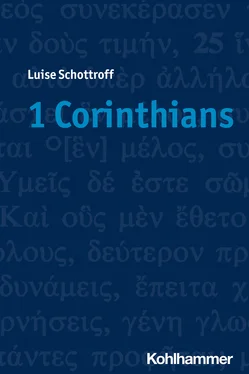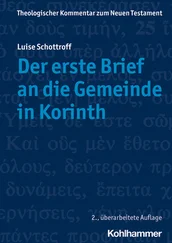Paul mentions Sosthenesas a co-author. In his letters Paul consistently understands himself as an »author in the plural.« 30Even though in 1:4 he mentions himself in the singular as the author, as he often does in 1 Corinthians, it is not right to understand him as the head of a »team of authors« or as an individual author. Instead, he understands himself to be part of a community of brothers and sisters. He calls Sosthenes brother,and, in the same way, he addresses the congregation as brothers and sisters (in 1:10, for example). This relationship as brothers and sisters is characterized by »mutual responsibility and solidarity.« 31It continues the biblical and post-biblical tradition according to which the members of the people of Israel understand themselves as brothers and sisters because of their connection to Israel’s one God. 32This relationship as brothers and sisters connects the people of non-Jewish origin not only with one another but also with the people of Israel. It opens up for them an alternative to the patriarchal family. Relationships in the patriarchal family are as a rule asymmetrical; those in the congregation are not. Whether the authority of the men and women apostles, teachers and prophets establishes an asymmetrical relationship will need to be discussed (see on 3:11).
1:2The congregation in Corinth is characterized in four ways by Paul. He calls it an » assembly/ ekklēsia of God.« The word still has its secular meaning: an assembly at a concrete place—as in Corinth or also in other places (16:1, 19). To some extent, these local assemblies have active contacts with each other. And yet Paul does not yet have in mind a »church« in the comprehensive sense. For him the word signifies each individual assembly of the people of God with faith in the Messiah in this place. 33It does not become Israel’s successor, but enters into solidarity with her. The word ekklēsia is linked not only with its secular meaning but also with God’s history with Israel in the Old Testament. 34 Kahal Adonai is also translated in the LXX by ekklēsia of God and designates, for example, the full assembly of Israel at Sinai (Deut 4:10) or the worshiping congregation (Ps 35:18). The word synagogē can be used in the same sense. A juxtaposition or opposition of ecclesia as a Christian church and »the« synagogue as Judaism does not yet exist at this time. In the city of Corinth there was room for large gatherings for varied political purposes (see, for example, Acts 18:12–17). Such assemblies are what people envisioned when they heard the word ekklēsia . Therefore, the word had an evident political ambiguity: God’s assembly is an alternative to the assembly of the city’s inhabitants in which those in power at any given time present and implement the things in which they are interested. Thus, the congregation, as an »alternative society, … is rooted in the history of Israel, in opposition to the pax Romana .« 35
The fact that those who believe in the Messiah are designated as calledand saintsonce again makes their relationship to the God of Israel central. God called them in the same way that God called the apostle (1:1). This call (7:17 for example) or election (1:28) has fundamentally altered their life. They now live, in keeping with their divine commission, in accord with the Torah (7:17; see there). The designation »saints« is tied to the holiness of the people of Israel (Lev 19–20). The holiness of the congregation is strongly emphasized in 1 Corinthians. The congregation is the place where God is present (3:16), and it is the body of Christ (12:12, 27).
Paul concludes his detailed theological appreciation for the congregation in the letter’s salutation by incorporating this congregation into the broader fellowship of all those who call upon the name of our kyrios Jesus Christ.
The expression is definitely to be taken literally: the believers openly proclaim, »Jesus is our Liberator«/ kyrios Jesus (see 12:3). The name that is invoked is the name »Jesus.« Jesus is a common name for Jewish men ( Joshua, Jeshua ). In early Christianity, this common name is given theological significance as a proper name for this Messiah, who was crucified by Rome and raised by God. 36Jesus receives this name from God, so that in this name the knees of the »heavenly, earthly and subterranean« powers should bend (Phil 2:10). These powers designate forces that enslave the earth and humanity (see 3:22; 15:24; see a more extensive explanation at 15:24). The name Jesusembodies the liberation brought about by God, for Jesus’ fate was based on his humiliation. God put an end to his death and his humiliation. He was exalted by God. A further theological reflection on Jesus’ name is found in Matt 1:21, 23. When people call on the name of Jesus, they put themselves in fellowship with the Jewish man liberated by God from violence and death. In this way he becomes their kyrios /Lord, their Liberator.
The word kyrios is also a word taken from everyday life at the time of the Roman Empire. It designates common relationships of rule and hierarchy: those of master and slave, of dependents (on the pater familias ) within the family, the oikos /household, and political power relationships. The emperor in Rome is kyrios / dominus of the people in the Imperium Romanum. In this context, when people declare that for them Jesus is the only kyrios (see 8:6), all other power relationships in which every woman and man lives are at least qualified and called into question. Thus, the use of this word changes the relationships in which the individuals live. In the Christian manuscripts of the LXX and in New Testament quotations of Scripture, the word kyrios is used as a substitute for the divine name. 37There is, therefore, discussion about whether the kyrios designation puts Jesus on a level with the God of Israel. This conclusion takes no account of the common use of the word. Moreover, it is problematic in the light of Jewish monotheism. It is more likely to assume that the word kyrios can be used for Jesus through its common use for power relationships without sensing an identification with the substitute word for the Tetragrammaton. It gets this meaning through its contrast with everyday power relationships.
1:3 Grace and Peace—In Paul, both words have a full theological resonance, while, at the same time, in this salutation he is also making use of the letter form and the Jewish greeting of Shalom . 38God’s favor (grace/ charis ) becomes effective through the actions of its recipients. 39The peace that comes from God contrasts with the peace-propaganda for the Roman peace, the Pax Romana. The peace of the Pax Romana is achieved with subject nations through military and non-military (legal and administrative) use of force. Emperor Augustus (27 BCE–14 CE) says in his testament that under his leadership his goal—which he repeatedly achieved—»was a peace consolidated through victories by land and by sea in the entire domain of the Roman people.« 40According to the biblical tradition, the peace of God has an entirely different quality: it signifies a comprehensive communal well-being and happiness for people, for entire cities, for a nation— shalom . Thus, this peace is oriented toward good life for the people, not the interests of those with political control. Through Jesus the Messiah, God has turned toward humanity and made peace accessible even for the people in Corinth.
Читать дальше












